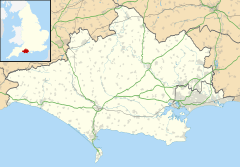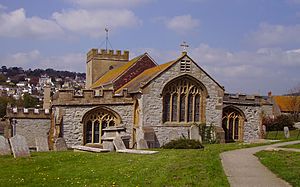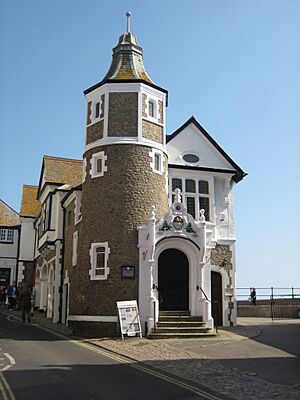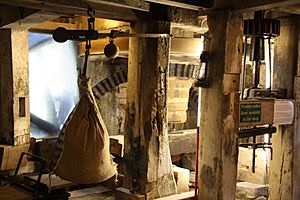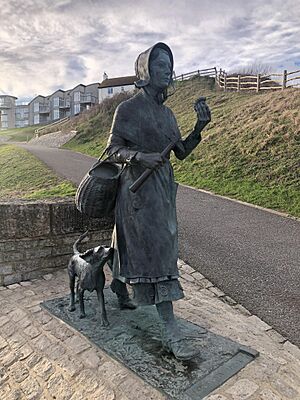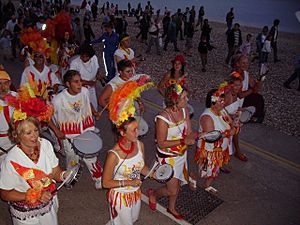Lyme Regis facts for kids
Quick facts for kids Lyme Regis
|
|
|---|---|
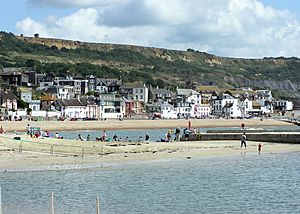 Lyme Regis from the Cobb |
|
 Coat of arms of Lyme Regis |
|
| Population | 3,671 (2011) |
| OS grid reference | SY337922 |
| • London | 135 miles (217 km) ENE |
| Civil parish |
|
| Unitary authority |
|
| Ceremonial county | |
| Region | |
| Country | England |
| Sovereign state | United Kingdom |
| Post town | LYME REGIS |
| Postcode district | DT7 |
| Dialling code | 01297 |
| Police | Dorset |
| Fire | Dorset |
| Ambulance | South Western |
| EU Parliament | South West England |
| UK Parliament |
|
| Website | Visit Lyme Regis |
Lyme Regis is a lovely town in west Dorset, England. It's about 25 miles (40 km) west of Dorchester. People sometimes call it the "Pearl of Dorset." It sits right by the English Channel, close to the border of Dorset and Devon.
Lyme Regis is famous for the amazing fossils found in its cliffs and beaches. This area is part of the Jurassic Coast, which is a special World Heritage Site. The town's famous harbour wall, called The Cobb, has even appeared in famous books and movies, like Jane Austen's novel Persuasion and The French Lieutenant's Woman.
A long time ago, a mayor and Member of Parliament from Lyme Regis, Admiral Sir George Somers, helped start the English settlement of Somers Isles, which is now Bermuda. Lyme Regis is even twinned with St George's there! In 2011, about 4,712 people lived in the urban area of Lyme Regis.
Contents
A Look Back in Time
In old Saxon times, monks from Sherborne Abbey had special rights to boil salt near the River Lym. The town of Lyme is even mentioned in the Domesday Book from 1086. In the 1200s, Lyme grew into one of Britain's most important ports.
King Edward I gave the town a special paper called a royal charter in 1284. This is when "Regis" was added to its name, meaning "of the King." Queen Elizabeth I later confirmed this charter in 1591.
In 1644, during the English Civil War, brave supporters of Parliament defended the town. They held out for eight weeks against the King's forces. Later, in 1685, The Duke of Monmouth landed in Lyme Regis to start his rebellion.
Lyme Regis became popular for seaside holidays in the 1700s. People believed sea air and water were good for their health. When wars made it hard to travel to other countries, rich tourists came to Lyme Regis instead. This is why famous people like Jane Austen visited. She even wrote parts of her novel Persuasion about the town.
Between 1811 and 1847, a pioneering fossil hunter named Mary Anning found many amazing Jurassic marine reptile fossils in the cliffs near Lyme Regis.
On New Year's Day in 1915, during World War I, a German submarine sank a ship called HMS Formidable. A local lifeboat brought bodies to an inn in Lyme Regis. A dog named Lassie, belonging to the inn owner, licked a seaman who was thought to be dead, and he seemed to wake up! This story helped inspire the famous dog character, Lassie.
In 1965, the town's train station closed. The old station was taken apart and rebuilt somewhere else.
Amazing Fossils and Nature
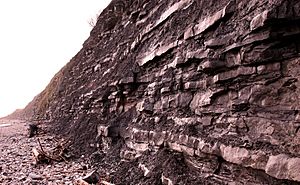
Lyme Regis is a coastal town in West Dorset. It's located in Lyme Bay, right on the English Channel coast. The town grew up around the mouth of the River Lim. This river flows down from hills and then goes south to the sea. Its name likely means "flood" or "stream."
The beaches and cliffs of Lyme Regis are famous for their fossils. They are part of the Jurassic Coast, a World Heritage Site that stretches for 153 kilometres (95 mi). This coast shows rock layers from 185 million years of Earth's history! You can find many important fossils here.
The Blue Lias and Charmouth Mudstone rock layers have lots of fossils from the Early Jurassic period. Many of these fossils are very well preserved. Some of the first discoveries of dinosaur and other ancient reptile fossils were made here by Mary Anning. Important finds include Ichthyosaurus, Plesiosaurus, and Scelidosaurus (one of the first armoured dinosaurs). Lyme Regis even has an annual Mary Anning Day and a Fossil Festival.
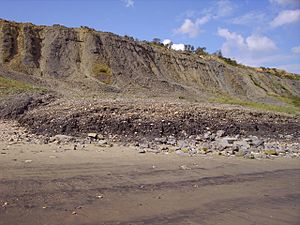
The coast near Lyme Regis often has landslips. These landslides help expose the Jurassic-age fossils on the beaches. A huge landslip happened in 1839, moving a large area of fields. This event attracted many visitors. The area is now known as The Undercliff and is interesting for its diverse nature.
Landslides continued to be a problem. In 2005, a big project started to make the cliffs safer and protect the town from coastal erosion. The main beach was rebuilt and reopened in 2006. In 2008, another large landslip occurred, which police called the "worst in 100 years." This meant a walking path had to be moved inland.
Town Life and People
In 2011, the town of Lyme Regis had 3,671 people living there. The population has changed over the years, but it has generally grown.
| Census Population of Lyme Regis Parish 1921–2011 (except 1941) | ||||||||||||||
|---|---|---|---|---|---|---|---|---|---|---|---|---|---|---|
| Census | 1921 | 1931 | 1951 | 1961 | 1971 | 1981 | 1991 | 2001 | 2011 | |||||
| Population | 2,882 | 2,620 | 3,200 | 3,526 | 3,400 | 3,450 | 3,760 | 3,530 | 3,671 | |||||
| Source: Dorset County Council | ||||||||||||||
Places of Worship and Learning
The main church in Lyme Regis is St Michael the Archangel. It's very old, dating back to the 1100s. Mary Anning is buried here, and there's a beautiful stained-glass window dedicated to her.
The Baptist church in Lyme Regis was started in 1653. There's also Bethany Chapel, which is an independent Christian church.
For learning, the Boat Building Academy teaches people how to build traditional boats and make furniture.
How Lyme Regis is Governed
Lyme Regis has its own local government called the Lyme Regis Town Council. They meet at the Guildhall, a historic building finished in 1889.
Lyme Regis has been a special town with its own rules since 1284. It used to be called a "borough." Today, the town council helps manage local services and represents the people of Lyme Regis.
Famous Landmarks
The Cobb: A Historic Harbour Wall
The Cobb is the town's famous harbour wall. The first mention of it is from 1328, when it was damaged by storms. It was originally made of oak poles and large stones. The Cobb protects the town from storms and creates a safe harbour for boats.
The Cobb was very important for the town's economy. It allowed Lyme Regis to become a busy port and a place where ships were built. From 1780 to 1850, almost 100 ships were built here! The port was very active for trade with France.
Storms have damaged or destroyed the Cobb many times. It was swept away in 1377. It has been rebuilt and repaired over the centuries, using stronger materials like Portland stone. The current Lyme Regis Lifeboat Station was opened in 1997.
Lyme Regis Marine Aquarium
The Lyme Regis Marine Aquarium has been open since the late 1950s. It's in an old stone building right on the Cobb harbour wall. The aquarium shows off the amazing sea creatures that live nearby.
Visitors can even feed a group of friendly fish, gently touch a lobster, and hold a starfish! Other creatures you might see include weaver fish, wrasse, and hermit crab.
Other Interesting Places
The Town Mill is an old watermill that dates back to 1340. It has been fixed up and now works again, making flour. It uses water from the River Lym to power its machinery. There was a mill here even in 1086, so the site is very old.
Near the Town Mill is the "Lepers' Well." In old times, this well was part of a hospital. The well water still flows today. The area around it has been made into a nice garden for visitors.
The Three Cups Hotel is a historic building from 1807. Many famous people have stayed there, including Jane Austen, Alfred Lord Tennyson, and J. R. R. Tolkien. During World War II, General Eisenhower even gave an important speech there before D-Day. The hotel was also used in the film The French Lieutenant's Woman.
The Royal Lion Hotel is another old building, once a coaching inn from the early 1600s. Some people say it's haunted!
On May 22, 2022, a new Statue of Mary Anning was revealed in Lyme Regis. This statue was made possible by people donating money to honor the famous paleontologist Mary Anning.
Fun Events and Culture
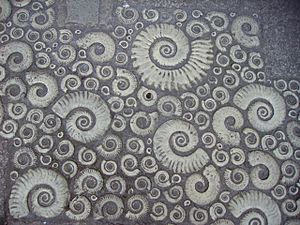
The Lyme Regis Museum is built where Mary Anning's home and shop used to be. It has local history items and exhibits about the town's amazing fossils. Outside the museum, you can see special Coade stone ammonites, which are like stone fossils.
The Dinosaurland Fossil Museum is in an old church where Mary Anning was baptized.
Lyme Regis celebrates Thanksgiving Day every year. This tradition started after the English Civil War to remember the town's victory in a long siege. People dress in old costumes and parade through the streets.
Other yearly events include the Lyme Regis Carnival and Regatta, the Lyme Regis Fossil Festival (with the Natural History Museum), and Mary Anning Day. There's also a fun "conger cuddling" event during Lifeboat Week!
Bonfire night celebrations include a torchlight parade and fireworks on the beach. At Christmas, there's a Christmas Tree Festival. An Easter bonnet parade happens on Easter Sunday, and a May Day fête has stalls and entertainment.
Lyme Regis is home to B Sharp, a music charity for young people. They offer music workshops and performances. They also run an annual Busking Festival and a "Big Mix" festival.
The Marine Theatre hosts many live shows and events. In 2012, the famous graffiti artist Banksy even left a stencil of an origami crane on a wall in town.
Lyme Regis has local TV and radio stations. The local newspaper is the Bridport & Lyme Regis News.
Lyme Regis in Books and Movies
The Cobb is famous for being in Jane Austen's novel Persuasion (1818) and its many film versions. The poet Tennyson supposedly went straight to the Cobb when he arrived, asking to see where a character from the book fell!
The Cobb also appeared in the 1981 movie The French Lieutenant's Woman, based on the novel by John Fowles. The town was also used for filming All Over the Town (1949).
Lyme Regis is also featured in the novel Possession by A. S. Byatt and the film made from it. The historical novel Remarkable Creatures by Tracy Chevalier is set in Lyme Regis and features fossil hunter Mary Anning.
The 2020 film Ammonite, starring Kate Winslet as Mary Anning, was filmed in Lyme Regis. The 2023 movie Wonka also filmed scenes here.
Sports in Town
Lyme Regis Football Club, known as the Seasiders, started in 1885. They have several teams for different age groups. Their senior teams play in local leagues. In 2010, famous football player Tony Cottee became the club's patron.
Famous People from Lyme Regis
- Admiral Sir George Somers (1554–1610): A naval officer who helped found Bermuda.
- Elizabeth Philpot (1780–1857): A fossil collector and amateur palaeontologist.
- Mary Anning (1799–1847): A pioneering fossil hunter on the Lyme Regis coast.
- John Gould (1804–1881): An artist and ornithologist who wrote and illustrated many books about birds.
- John Fowles (1926–2005): The author of The French Lieutenant's Woman, who lived in Lyme Regis for many years.
- Ian Gillan (born 1945): The lead singer of the famous rock band Deep Purple, who lives in Lyme Regis.
Images for kids
See also
 In Spanish: Lyme Regis para niños
In Spanish: Lyme Regis para niños


